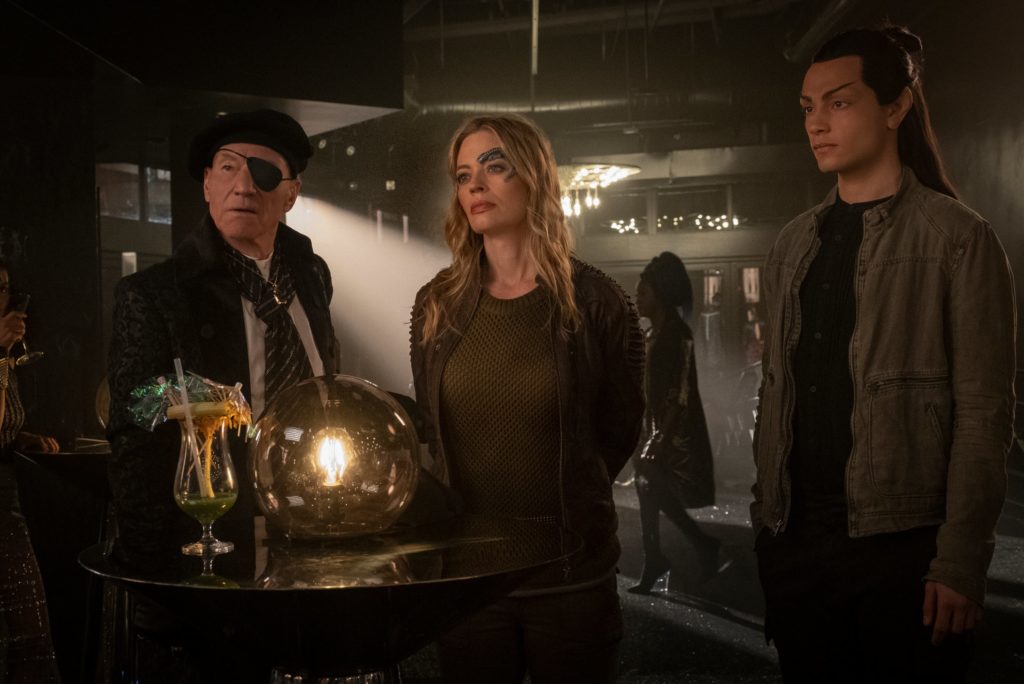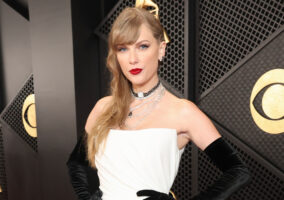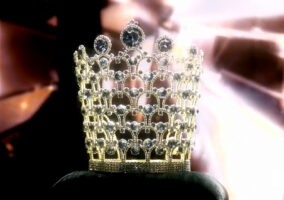
Oscars coverage prevented us from doing a review of last week’s episode but suffice it to say that the Romulan warrior nuns were a lot of fun and despite the poor character design of Romulan Legolas, the de facto crew of La Sirena is turning out to be an entertaining, engaging (pun intended), and well defined cast of characters; a factor that’s essential to any Trek show’s success and one that Star Trek: Discovery has yet to fully master. With this week’s episode, we see both how well Star Trek: Picard uses deep Trek lore to its advantage while at the same time showing us how much it wants to question that lore and its conclusions and assumptions. It’s a trick we remain impressed by, even as we start to wonder if this approach can be sustained over the course of the series.
We (and by that we mean Tom) are not hardcore on the idea that Star Trek should remain a certain way forever. We think the best versions of the franchise worked because they commented on the world and concerns of the people watching it, which means that a Star Trek show in 2020 really shouldn’t look and sound like one from 1966 or 1987. This becomes a problem because Star Trek is largely characterized by the worldview of its creator, the late Gene Roddenberry, who insisted on a utopian society of explorers, scientists and diplomats for his version of the future. The franchise has turned away from this view enough times in various films and series that it shouldn’t really be considered all that shocking anymore, but even we, who are open to a darker, grayer, even more violent Star Trek, were shocked to see Star Trek: Voyager’s Icheb get brutally ripped apart in this episode’s opening scene. We were less shocked to see Dr. Jurati’s turn toward the dark side (you’ll pardon the phrasing), but even so, that was a notably brutal death scene for the re-introduced Bruce Maddox. In both cases, what made those starkly brutal opening and closing scenes so much more shocking was how they bookended an episode that was more or less a light adventure romp, a fantastic re-introduction of an old favorite, and an episode that owed more to classic Star Trek in tone and style than anything we’ve seen so far in the series.
It’s that see-sawing of old Trek lore and new Trek style that characterizes Picard and it’s an approach that’s mostly worked for its first five episodes. But we have to admit, this episode gave us reason to doubt. “Where’s your cortical node, buddy?” they asked Icheb as they placed the drill against his forehead. They’re diving so ridiculously deep on the lore (Icheb doesn’t have his cortical node because he donated it to Seven to save her life in an episode of Voyager) while pushing so hard against the boundaries of that lore. Here’s Bruce Maddox, central to our plot, seen only once onscreen before in a 30-year-old episode of Next Generation. See how deep we’re diving? Now he’s dead. Bjayzl, with her elaborate hair, broad shoulders and glittering bodysuit, looks every inch a classic Star Trek character. She’s Deanna Troi from the neck up and Seven of Nine from the neck down, this archetypal sci-fi evil queen figure. And here comes Seven of Nine, the former unquestionable pinup queen of Star Trek, in a comfy sweater, jeans and leather jacket, killing her former image dead with double phaser fire. It’s a very fine line they’re treading; one that pays deep homage to the Next Gen, Voyager and DS9 universes at the same time it seems to be dismantling them. And while it’s still working, we find ourselves leaning very hard on the hope that this is all leading toward a redemption of sorts, if not for the Federation or Starfleet, then at least for the title character.
Picard continues to get deconstructed as a character. Last week’s episode highlighted his ego and underlying colonialist attitude. This week Seven called him out on his pretensions. “But you like it enough to keep it,” she notes dryly when Picard protests that his holo-chateau wasn’t his idea. Granted, we felt the Picard/Seven interactions were largely well-handled, but pretty much every episode of this show has someone new come in to berate Picard for his failures and flaws. You can make the argument that he has an ego and you can even connect that to his failed actions and colonialist attitudes, but if you lean too hard on that, you risk rewriting the character into something he never was. It’s okay to let Picard remain noble, if flawed. It’s not okay to render him deeply flawed with an undercurrent of nobility. They’re not quite there yet – and Stewart’s exemplary work here is going far to temper the skewering he’s getting – but we hope Picard never again comes off as silly as he did in this episode. The man’s done plenty of undercover work in his career. There was no need for that ridiculous accent.
If we sound apprehensive it’s only because the show has done such a fantastic job of bringing the 24th Century of Star Trek into the 21st Century of television. They’ve created good, strong characters with distinct back stories and the capability of interacting with each other in interesting ways. We like seeing a broken Picard regaining his sense of self and we don’t mind a Federation or Star Fleet with a corruption issue. But with its reliance on a corrupt and fading Federation, warlords, crime bosses and vigilante rangers as backdrops, there’s a danger this show is going to feel more like Star Wars than Star Trek. The thing about Trek is that it has its own particular flavor, morality, language and aesthetic. You can push against those boundaries to explore their meaning, but if you break too many of them, you’ll just have a generic space adventure.
Speaking of which, Seven and the Fenris Rangers sound like a spinoff show just waiting to be developed – and if that’s the case, we’ll accept Ryan’s guest star status here. But it was a bit disappointing to see her and Picard go their separate ways at the end of this episode. Granted, the last time we saw her she was in the middle of a firefight and the likelihood of her showing up again before the season is over remains fairly high. Still, it was absolutely fantastic seeing Ryan again in the role and one of the very best things about this show is how it’s exploring the idea of post-Borg traumatic stress. We can’t wait to have Hugh, Seven and the former Locutus all in the same room.
In other news, we feel it should be noted that this fun, energetic, boundary-pushing episode contained no scenes on the so-called Artifact. We don’t mind Soji, but the Romulan Wonder Twins, who do little more than hiss exposition while pretending to lick each other’s faces, remain the one aspect of the show that has failed to launch as of yet. It was something of a relief to be spared another wheel-spinning scene with them, since it’s clear Soji’s story isn’t going to progress much until Picard and his crew show up, but if we had to suggest trimming some fat from this story, they’d be our first choice to go.
Pop Style Opinionfest: The Ever-Expanding World of “Drag Race” Next Post:
Friday Leftovers for the Week of January 16th, 2020
Please review our Community Guidelines before posting a comment. Thank you!



